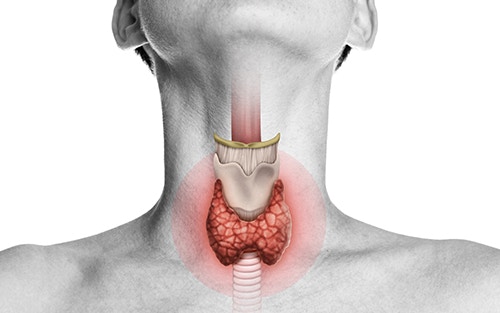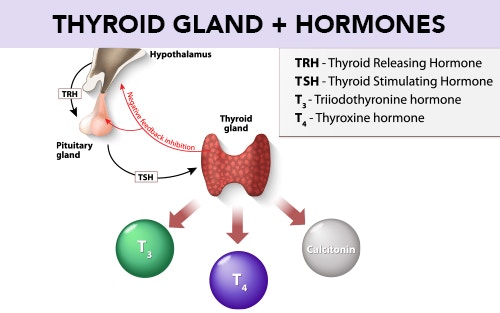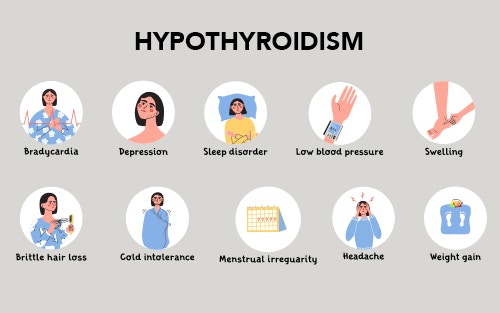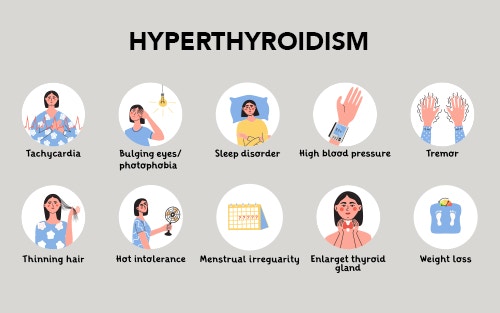Thyroid disease disrupts the function of your thyroid gland, impacting your metabolism, energy levels, and overall health. In this yourfootpalace.com article, we cover the causes, symptoms, and treatment options for thyroid disorders. Whether you’re experiencing hypothyroidism, hyperthyroidism, or other thyroid issues, understanding these conditions is crucial for effective management.

Key Takeaways
- The thyroid gland regulates metabolism by producing hormones T3 and T4, with disorders like hypothyroidism and hyperthyroidism resulting from hormone imbalances.
- Common symptoms of hypothyroidism include fatigue and weight gain, while hyperthyroidism may cause anxiety and weight loss; both conditions require accurate diagnosis and treatment.
- Autoimmune conditions, such as Hashimoto’s thyroiditis and postpartum thyroiditis, significantly impact thyroid health, with early detection and management crucial for maintaining well-being.
The Role of the Thyroid Gland
The thyroid gland is a small butterfly-shaped gland located at the base of the neck, right below the Adam’s apple. Despite its modest size, the thyroid plays a crucial role in regulating the body’s metabolism. It produces thyroid hormones, primarily thyroxine (T4) and triiodothyronine (T3), which control how the body uses energy, affecting nearly every organ in the body. These hormones help regulate the number of calories burned, heart rate, and overall body metabolism, impacting energy levels and various bodily functions.

The pituitary gland, a small gland at the base of the brain, produces thyroid-stimulating hormone (TSH), which signals the thyroid gland to produce more thyroid hormones or less T3 and T4 to maintain adequate hormone levels. This feedback loop ensures that the body maintains a balanced level of thyroid hormones.
When the thyroid produces too much or too little hormone, it can lead to thyroid disorders such as hypothyroidism or hyperthyroidism, each with its own set of symptoms and health implications.
Common Types of Thyroid Diseases
The thyroid gland can be affected by several disorders, each impacting how hormones affect the body’s ability to regulate metabolism and energy levels. Hypothyroidism is an underactive thyroid that occurs when the thyroid gland does not produce enough thyroid hormones; this condition leads to symptoms such as fatigue, weight gain, and depression.
On the other end of the spectrum, hyperthyroidism, or an overactive thyroid, is characterized by the production of too much thyroid hormone, which can cause an increased risk of rapid heartbeat, weight loss, and anxiety.
Other common thyroid disorders include goiter, which is an enlargement of the thyroid gland often due to iodine deficiency, and thyroid nodules, which are swellings within the thyroid that may need evaluation for treatment options.
Thyroid cancer is a serious condition that impacts the thyroid gland and requires early diagnosis for effective treatment. Gaining a clear understanding of common thyroid diseases and their symptoms is the first step toward maintaining proper thyroid health.
Hypothyroidism: Causes and Symptoms
Hypothyroidism, also known as an underactive thyroid, occurs when the thyroid gland does not produce enough thyroid hormone. This condition can be caused by several factors, with the most common being Hashimoto’s thyroiditis, an autoimmune disorder where the immune system attacks the thyroid gland. Other causes include thyroiditis (inflammation of the thyroid gland), radiation treatment for head and neck cancers, and a family history of thyroid disease.
The symptoms of hypothyroidism can vary widely, include fatigue, weight gain, depression, dry skin, a slow heart rate, and be aware that symptoms may develop slowly over time.

If you consistently feel tired for no apparent reason or notice other signs and symptoms of hypothyroidism, it is important to consult a healthcare provider to receive an accurate diagnosis and appropriate treatment.
Diagnosing Hypothyroidism
Diagnosing hypothyroidism typically begins with:
- Taking a detailed medical history.
- Performing a physical examination, during which your healthcare provider may check for symptoms such as dry skin, swelling, and a slow heart rate.
- Conducting blood tests to confirm the diagnosis by measuring the levels of thyroid-stimulating hormone (TSH) and thyroid hormones in the blood.
An elevated TSH level combined with a low T4 level usually confirms a diagnosis of hypothyroidism. Regular monitoring of TSH levels is essential to determine the correct dosage of thyroid hormone medicine and to ensure that the hormone levels are maintained within a normal range.
It is also important to note that certain medications and supplements can affect blood test results, so be sure to inform your healthcare provider of any substances you are taking.
Treating Hypothyroidism
The standard treatment for hypothyroidism is thyroid hormone medicine, typically in the form of levothyroxine, which is a synthetic hormone that replaces the deficient T4. Patients with hypothyroidism will need to take thyroid hormone medication for life to maintain normal thyroid hormone levels. Most individuals start to notice improvements in their symptoms within one to two weeks after beginning treatment.
The dosage of levothyroxine may need to be adjusted based on regular monitoring of TSH levels. For optimal absorption and effectiveness, consider the following recommendations:
- Take the medication on an empty stomach, preferably in the morning.
- Maintain consistency in taking the medication.
- If a dose is missed, take it as soon as remembered to prevent the return of symptoms.
While alternative treatments like desiccated thyroid extract exist, they are generally not recommended due to inconsistent hormone content.
Hyperthyroidism: Causes and Symptoms
Hyperthyroidism is a condition where the thyroid gland becomes overactive and produces excessive amounts of thyroid hormones. The most common causes of hyperthyroidism include:
- Graves’ disease, an autoimmune disorder that results in the overproduction of thyroid hormones
- Thyroiditis, which inflames the thyroid gland and releases stored hormones
- Certain chronic illnesses, like pernicious anemia
The symptoms of hyperthyroidism can be intense and varied. Common symptoms include:
- irritability
- anxiety
- weight loss
- a fast heartbeat
- heat intolerance
- diarrhea
- increased appetite despite losing weight
- tremors in the hands and fingers

If you experience these noticeable symptoms, it is important to seek medical advice to determine the underlying medical condition and receive appropriate treatment.
Diagnosing Hyperthyroidism
Diagnosing hyperthyroidism involves:
- Reviewing the patient’s medical history
- Performing a physical exam, during which the healthcare provider looks for signs such as tremors, rapid pulse, and warm skin
- Conducting blood tests to measure levels of T-4, T-3, and TSH to confirm hyperthyroidism
If hyperthyroidism is suspected, additional tests such as iodine uptake and thyroid ultrasound may be recommended. The iodine uptake test measures how much iodine the thyroid gland absorbs, which helps determine its hormone production level.
These diagnostic tools are crucial for confirming the diagnosis and determining the best treatment approach.
Treating Hyperthyroidism
There are several treatment options for hyperthyroidism, each aiming to reduce the production of thyroid hormones. One common treatment is radioactive iodine therapy, which:
- Targets and destroys overactive thyroid cells.
- It is often recommended if antithyroid medications are ineffective or if surgery poses too many risks.
- Requires patients preparing for therapy to stop thyroid-suppressing medications.
- Involves following a low-iodine diet in advance.
Other treatment options include antithyroid medications that reduce hormone production and surgical removal to remove part or all of the thyroid gland.
After receiving radioactive iodine, patients should follow certain precautions, such as avoiding close contact with others and delaying pregnancy for several months. The success rate for radioactive iodine therapy is high, with a significant cure rate reported after a single dose.
Understanding Goiter
A goiter is an enlarged thyroid gland that can result from various factors, including iodine deficiency, which affects approximately 2.2 billion people worldwide. Symptoms of goiter may include:
- swelling in the neck
- a tight feeling in the throat
- coughing
- Difficulty swallowing or breathing. Goiters can present in different forms, such as:
- simple
- nodular
- multinodular, depending on how the thyroid enlarges.
Treatment for goiter depends on its size and symptoms. Options may include:
- Medication to reduce the size of the thyroid
- Surgery to remove part or all of the gland if it causes significant symptoms or complications
- Managing iodine intake through diet to help prevent and treat goiter.
Managing Thyroid Nodules

Thyroid nodules are lumps that can develop within the thyroid gland and are more common in women than men. Most nodules are asymptomatic, but some can cause hyperthyroidism, swallowing difficulties, or breathing issues. Thyroid ultrasound is a primary imaging technique used to detect and characterize nodules, assessing their features and determining whether they are solid, liquid, or mixed.
Fine-needle aspiration (FNA) biopsies are critical in managing thyroid nodules, especially to rule out malignancy. The management of thyroid nodules often involves a case-by-case assessment, considering factors like size and ultrasound characteristics. Incidental nodules smaller than 1 cm typically do not require biopsy but should be monitored regularly.
Recognizing Thyroid Cancer
Thyroid cancer develops when malignant cells originate from the tissues of the thyroid gland. This can lead to serious health complications. Signs of thyroid cancer may include:
- Swelling or a lump in the neck
- Difficulty swallowing
- A hoarse voice. While routine screening for thyroid cancer is not recommended for the general population, some cancers are identified through imaging tests done for unrelated health issues.
To determine if a thyroid nodule is cancerous, doctors may order additional tests, such as ultrasound and fine-needle aspiration biopsies. The primary treatment for thyroid cancer is surgery to remove the thyroid gland, often followed by radioiodine therapy to destroy any remaining cancer cells. The prognosis and treatment approach depend on the cancer’s size and whether it has spread.
Autoimmune Thyroid Diseases
Autoimmune diseases are a leading cause of thyroid disorders, with Hashimoto’s disease being the primary cause of hypothyroidism. In autoimmune thyroiditis, the immune system attacks the thyroid gland, leading to inflammation and impaired function. Women with autoimmune thyroiditis are more likely to experience pregnancy complications, affecting both the mother and the baby.
Thyroid eye disease, often associated with hyperthyroidism, can cause symptoms like bulging eyes and vision issues. Postpartum thyroiditis, another autoimmune condition, can increase the risk of developing similar conditions in future pregnancies.
Understanding and managing these autoimmune conditions are crucial for maintaining thyroid health.
Thyroid Disease During Pregnancy

Maintaining proper thyroid hormone levels during pregnancy is crucial for the baby’s brain development and overall health. Untreated hypothyroidism can lead to severe risks such as preeclampsia, pregnancy loss, and developmental issues in infants. Thyroid hormone levels naturally increase during pregnancy, peaking around week 16, which can complicate the diagnosis of thyroid diseases.
Routine screening for thyroid disease is recommended to detect subtle symptoms that overlap with normal life pregnancy changes. Early detection and management of thyroid conditions in pregnant women are essential to reduce risks to both the mother and the fetus.
Women with diagnosed hypothyroidism may require thyroid hormone replacement therapy to meet increased hormone needs during pregnancy.
Postpartum Thyroiditis
Postpartum thyroiditis is an inflammation of the thyroid gland that occurs after childbirth, often presenting in phases of hyperthyroidism followed by hypothyroidism. This condition affects about 5% to 10% of women within the first year after childbirth and can lead to feelings of tiredness and moodiness. Women with pre-existing autoimmune diseases, such as type 1 diabetes, are at a higher risk of developing postpartum thyroiditis.
Treatment for postpartum thyroiditis varies depending on the symptoms and phases of the condition:
- Hormone replacement therapy may be necessary if hypothyroidism persists.
- Most women fully recover within 12 to 18 months.
- There is a risk of developing permanent hypothyroidism in subsequent years.
Thyroid Disease and Fertility
Thyroid disorders can significantly impact fertility by disrupting the hormonal balance necessary for regular ovulation. Effects include:
- Elevated prolactin levels from hypothyroidism can inhibit ovulation.
- Hyperthyroidism can cause changes in menstrual cycles, affecting their regularity.
- Severe thyroid-related issues can lead to prolonged absence of menstruation, known as amenorrhea.
For women experiencing fertility issues, it is important to evaluate thyroid function as part of the diagnostic process. Proper management of thyroid disorders and women’s health can help restore hormonal balance and improve fertility outcomes.
When to Seek Medical Advice
If you experience signs and symptoms such as unexplained fatigue, noticeable weight changes, or a lump in your neck, it is advisable to consult a healthcare provider. Early detection of thyroid issues can lead to more effective management and prevent further complications. Your healthcare provider will likely perform lab tests and take a detailed medical history to determine if a thyroid disorder is present.
It is important to be proactive about your thyroid health, especially if you have risk factors such as a family history of thyroid disease or other autoimmune conditions. Regular checkups can help identify thyroid problems in their early stages, according to the American Thyroid Association, allowing for timely intervention and better health outcomes.
Thyroid Summary
Understanding thyroid diseases, their causes, symptoms, and treatment options is crucial for maintaining overall health. The thyroid gland plays a vital role in regulating metabolism, and its dysfunction can significantly impact your well-being. From hypothyroidism and hyperthyroidism to goiter, thyroid nodules, and thyroid cancer, recognizing the signs and seeking timely medical advice can lead to effective management and improved quality of life. Stay informed and proactive about your thyroid health to ensure a healthy future.
Thyroid Disease Frequently Asked Questions
What are the common symptoms of hypothyroidism?
Common symptoms of hypothyroidism are fatigue, weight gain, depression, dry skin, and a slow heart rate. It is important to recognize these signs for timely diagnosis and management.
How is hyperthyroidism diagnosed?
Hyperthyroidism is diagnosed by reviewing medical history, conducting a physical examination, and performing blood tests to measure T-4, T-3, and TSH levels. Accurate diagnosis is essential for effective management of the condition.
What is the standard treatment for hypothyroidism?
The standard treatment for hypothyroidism is levothyroxine, a thyroid hormone medication that effectively replaces the deficient T4 hormone. This therapy helps restore normal thyroid function and alleviate symptoms associated with the condition.
Can thyroid disorders affect fertility?
Thyroid disorders can indeed disrupt the hormonal balance required for regular ovulation, thereby negatively impacting fertility. Addressing these hormonal imbalances is essential for improving reproductive health.
When should I seek medical advice for thyroid issues?
You should seek medical advice if you experience unexplained fatigue, noticeable weight changes, or a lump in your neck, as early detection is crucial for effective management of thyroid issues.